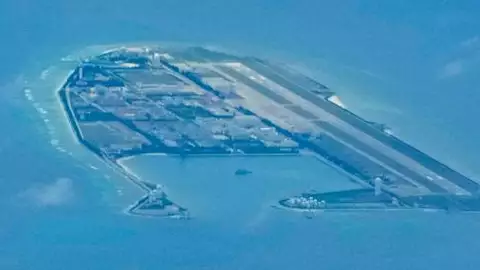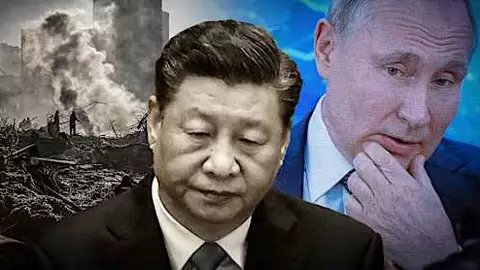EXECUTIVE SUMMARY: Notwithstanding the seeming friendship between Chinese president Xi Jinping and Russian president Vladimir Putin, and the growing congruence of both countries’ interests in undermining the US-led international order, relations between Russia and China remain at their core as brittle and prone to mutual suspicion and distrust as they have in the past. It is not unreasonable to expect that that underlying animosity will erupt into violence in the relatively near future.
By Pravin R. JethwaJuly 18, 2019
During his state visit to Russia earlier this month, President Xi Jinping of China effusively hailed President Vladimir Putin of Russia as his “best friend and colleague.” Putin, not to be outdone, replied by affirming his personal respect for Xi, and suggested that Sino-Russian relations have progressed not only to an “unprecedentedly high level” in recent years, but are now increasingly based on a “truly comprehensive partnership and strategic interaction.”
But whatever Putin means by “strategic interaction,” and despite the undeniable progress in Sino-Russian relations over the past decade, it is easy to fall into the trap of exaggerating what some fear is an emerging Sino-Russian “axis” in world politics. Notwithstanding the Xi-Putin friendship and the growing congruence of both countries’ interests in undermining the US-led international order, relations between Russia and China remain at their core as brittle and prone to mutual suspicion and distrust as they have in the past.
It is, after all, only 50 years since the two Eurasian giants nearly stumbled into a cataclysmic war following a series of unprovoked Chinese attacks on Soviet troops garrisoned along the then-contested river boundaries in Russia’s Far East. Although Moscow stayed its hand from an all-out military assault on China, the border clashes of 1969 continue to rankle historical memories and military thinking in Russia to this day.
Such territorial jostling along the vast expanses of Eurasia has, in fact, defined Russo-Chinese relations historically, and will continue to do so in the future.
And therein lies the existential rub, especially for Russia. From the perspective of a strategic planner in Moscow, China – which contains a billion-and-a-half people – not only dwarfs Mother Russia in population, national power, and economic might. It has also – much more worryingly – become a near military equal, prone to intimidation and throwing its weight around its periphery at will. Witness, for example, Beijing’s swift and brazen conquest of the South China Sea, the unrelenting probing into Vietnamese, Philippine, and Japanese maritime spaces, and to its west, the frequent incursions, stand-offs, and aggressive territorial claims against India.
None of these acts of Chinese belligerence will have escaped the notice of Russian planners who, despite the paradox of Moscow’s shared strategic interests with Beijing to counter America’s power and influence in world affairs, are nonetheless bound to view China’s rapid and inexorable rise to the front rank of global powers with acute concern.
But despite any apprehensions Moscow may quietly harbor, Russo-Chinese relations in the short term – over the next four or five years – are likely to remain largely in harmony. This is mainly because Putin’s carefully tended relationship with Xi enables him, among other things, to maintain the pretense of Russia as a great power, attract Chinese investment, and, more generally, project an image of himself as a world-class statesman.
And Xi, though leading an immeasurably more powerful country than Russia except in terms of offensive nuclear firepower, tactfully grants Putin the appearance and status of an equal through elaborately choreographed summit meetings, the bestowing of high level state and friendship awards, and personal respect, in order to secure at least tacit deference by Moscow to the Sino-centric Eurasian geopolitical order currently being planned in Beijing.
Yet beyond the apparent bonhomie and geopolitical dalliance between Xi and Putin, the historic and atavistic tensions deeply rooted between the Slavic and Han civilizations represented by Russia and China are bound to emerge again, probably in violent form, in the next decade.
In fact, signs already abound of Russian nervousness as China relentlessly pushes its Silk Road initiatives, coercive economic practices, and diplomatic blandishments deep into the entire former Soviet space in Central Asia. Although the Chinese have so far refrained from asserting strategic-security rights in the geopolitical arc along Russia’s southern periphery, it is only a matter of time before some hyper-nationalist general in Beijing does so. The Russians can be relied upon to react with unrestrained fury.
But what will likely drive Russia to a defensive war with China before the next decade is out is the growing probability of Chinese territorial encroachment into Russia’s sparsely populated far eastern region bordering the Pacific. The Russian territories north of the Amur and east of the Ussuri Rivers in eastern-Central Asia, which currently demarcate the agreed boundaries between the two countries, are historically and insistently claimed by China. Chinese military maps even show these areas as Chinese territories.
These territorial claims, combined with the sheer population disparities – over 130 million people live in three Chinese provinces bordering Russia’s Far East, where the population is estimated at less than 8 million – and the need to secure long-term access to living space and natural resources almost preordains that Beijing will sooner or later demand revisions to what it calls “unequal” border treaties with Czarist Russia dating back to the mid-19th century. And although the Russians are equally bound to resist, it is not inconceivable that China at some point will demand access or land-lease rights to parts of Russia’s Far East, or, failing that, that the Chinese army will simply march across the border into Vladivostok, Russia’s only warm water access to the Pacific, to stamp China’s historic claim and rights to the region.
It is not clear at this juncture how Russia and China can step back from a conflict in the coming decade. But as China appears unlikely to relinquish its expansive territorial claims against its neighbors, including Russia, the onus for deterring China from seizing Russian territories will fall upon Putin or his successors in the 2020s.
The question of whether China really can be deterred as its geostrategic ambitions grow across Eurasia remains to be seen. If the current Xi-Putin bromance fails to tamp down Chinese expansionism, expect a war between the two nuclear armed states in the 2020s.
View PDF
Pravin R. Jethwa is a consultant on defense and international security in London.
https://besacenter.org/expect-war-russia-china/
























